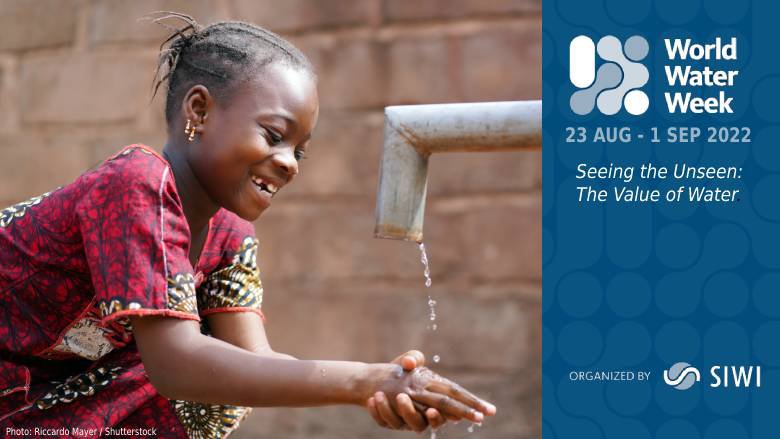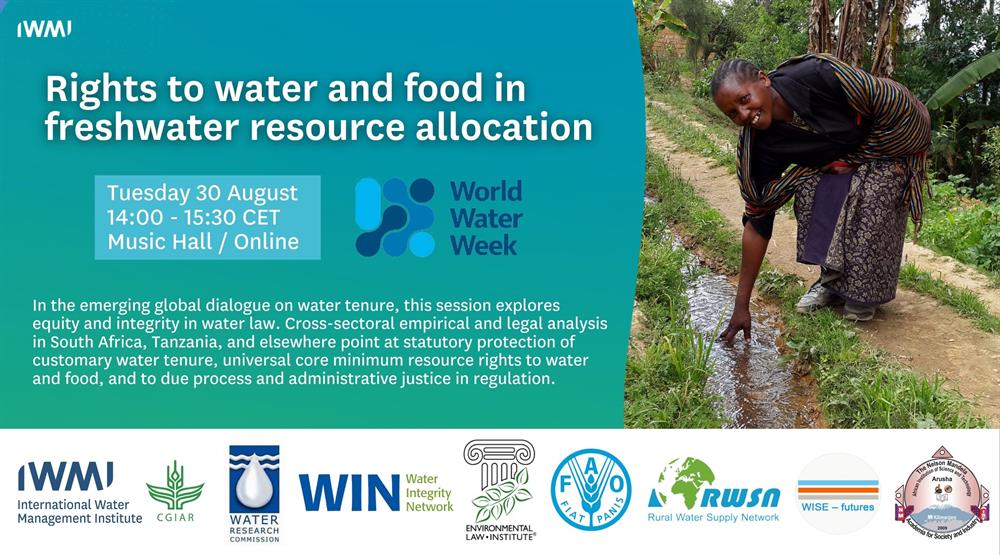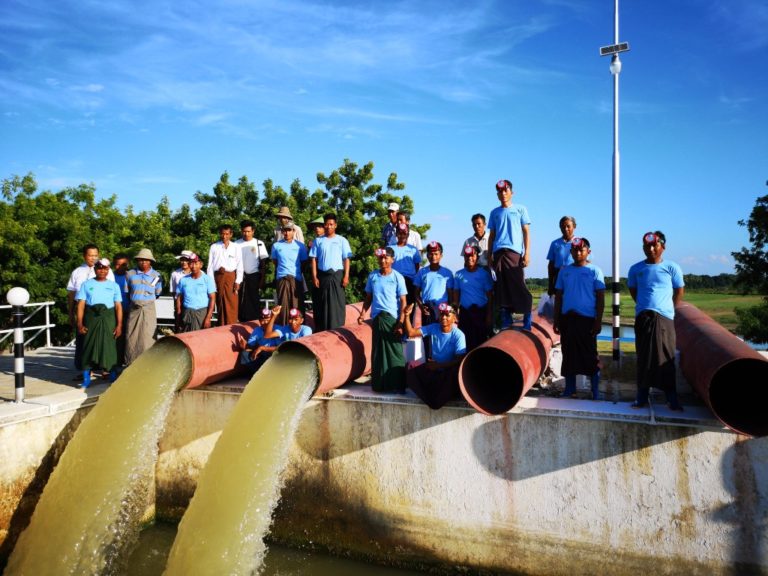It presents solutions to the planet’s greatest water-related challenges, such as poverty, the climate crisis, and biodiversity loss.
Extracts of the programme:
23/08 “On the money”: Innovating finance to enable farmer-led irrigation
Irrigation can strengthen resilience, improve nutrition and increase incomes, but low access to technologies has limited growth. Credit access alone will not unlock access to irrigation technologies. Instead, scaling farmer-led irrigation requires changes in a complex finance ecosystem that includes farmers, finance providers, value chain actors and equipment suppliers.- Constraints on farmer demand for credit and the supply of credit at the farm household level (IFPRI, Bedru Balana)
- Innovative Financing for Water in Agriculture: An Indian case study (World Bank, Svetlana Valieva and Eeman Amjad)
- Role of public agencies and subsidy programs: A case study from Rwanda (Grace Mukarusagara, DWFI, University of Nebraska)
- Finance needs of irrigation equipment suppliers expanding into new markets and taking on risks to reach smallholders market segments: Insights from Ghana and Mali’ (IWMI, Minh Thai)
- Financing Irrigation for Women & Smallholders: Lessons from Women's World Banking's financial inclusion research (Women’s World Banking, Megan Baumann)
23/08 Rights to water and food in freshwater resource allocation
This session brought WASH, irrigation and other water sectors together to explore integrity and redistributive justice in water law, including statutory protection of indigenous communities and universal core minimum resource rights to water and food. It unraveled intersections between water law, constitutions, land and resource law, customary law, and human rights.24/08 SIWI Seminar: Achieving 2030 food/nutrition targets through water security (1/3)
The session highlighted the status and trends in the global food and water systems by asking, “Are we on track to achieve water and food security by 2030?”. Furthermore, "What pathways and actions have emerged from the UN Food System Summit 2021 and since, that support achieving water-food security targets?"
24/08 Water for Agriculture: Triggering a Quantum Leap in Performance
The session showcased the recent development of frameworks and tools for irrigation performance benchmarking and assessment. These assessments shift from the traditional methods of monitoring performance to integrate innovative technologies, indicators with high operational relevance and forward-looking elements such as climate resilience, environmental stewardship, inclusion, and customer orientation.30/08 Water, food and nutrition in a climate crisis: Field insights
The session shared insights from the Nutrition-sensitive-agriculture water productivity project being implemented by FAO/IFAD in Benin-Mozambique-Niger-Egypt-Jordan-Rwanda which aims to strengthen capacities of farmers to access and implement sustainable-production-practices that increase economic yields and dietary diversity. National project-administrators and government representatives will share successes and challenges to-date.31/08 The role of Regenerative Agriculture and farmers in groundwater management
Talk show session hosted by BlueRisk with Cargill and TNC representatives. The interview focused on:
- What role Regenerative Agriculture can play in groundwater management- innovation + benefits
- How Regenerative Agriculture and Nature-Based Solutions fit in a watershed approach
- How to drive scale through famer-centric solutions while adapting to a changing marketplace and a changing climate
31/08 Transforming Investments in African Rainfed Agriculture for the Zambezi Watercourse
The session mobilized finance from public and private sources for activities that support rural communities along the Zambezi Watercourse by enhancing rainfed agriculture, increasing food security, improving climate resilience/water and land management, and creating jobs and sustainable livelihoods whilst contributing to growth and development.
Within this context, the Zambezi Watercourse Commission (ZAMCOM) partnered with the Stockholm International Water Institute (SIWI) to formulate the TIARA programme whose main objective is to increase attention and investment in enhanced rainfed agriculture across the Watercourse.
ZAMCOM developed a Strategic Plan for the Zambezi Watercourse (ZSP) with a "Livelihoods Support" Pillar, which includes integration of the development of investment initiatives into enhanced rainfed agriculture in the Watercourse. This strategy aims to increase water availability for smallholder farmers through improved rainfed agriculture practices.
- Transforming Investments in African Rainfed Agriculture (TIARA) initiative - Kasonde Mulenga, Programme Manager SIWI
- Zambezi Strategic Plan, a framework for climate-smart investments into rainfed agriculture in the Zambezi - Evans Kaseke, Programme manager ZAMCOM
- Global experiences and responses to landscape management - Professor Catherine Muthuri, Kenya Country Director and Regional Convener for East Africa, CIFOR-ICRAF
01/09 Regenerative agriculture to value water and soils
Convenors: Coalition of Action for Soil Health, International Institute for Applied Systems Analysis, International Union for Conservation of Nature, World Agroforestry Centre.
- The state of play: key note presentations outlining the linkages between regenerative farming and sustainable food production: Role of soil health for improved hydrologic function across farming landscapes, CA4SH
- A panel discussion bringing perspectives from business, farmers and government;
- An interactive discussion with the audience on opportunities for valuing water through agroecological approaches.




No comments:
Post a Comment